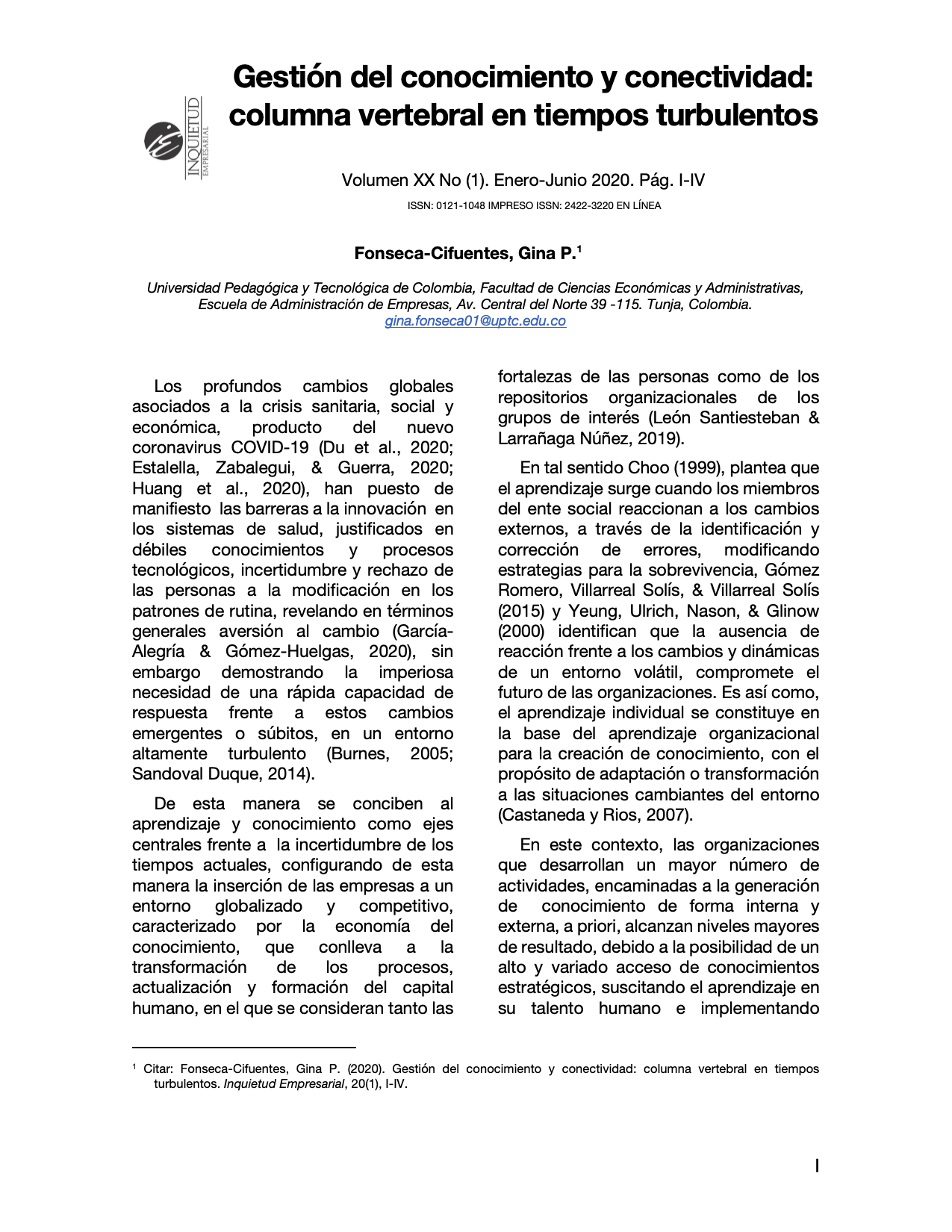Knowledge management and connectivity: mainstay in turbulent times

Abstract
The profound global changes associated with the health, social and economic crisis, resulting from the new coronavirus COVID-19 (Du et al., 2020; Estalella, Zabalegui, and Guerra, 2020; Huang et al., 2020), have highlighted the barriers to innovation in healthcare systems, justified in weak knowledge and technological processes, uncertainty and people's rejection of modification in routine patterns, revealing in general terms aversion to change (García-Alegría and Gómez-Huelgas, 2020), however demonstrating the imperative need for a rapid response capacity in the face of these emerging or sudden changes, in a highly turbulent environment (Burnes, 2005; Sandoval Duque, 2014).
Received: 10/06/2020. Accepted: 15/06/2020. Published: 18/06/2020.
Keywords
spanish
References
- Alcalá Casillas, M. G. (2017). La galaxia internet: reflexiones sobre internet, empresa y sociedad, de Manuel Castells. Revista Mexicana de Ciencias Políticas y Sociales, 62(231), 407—412. DOI: https://doi.org/10.1016/S0185-1918(17)30051-X
- Burnes, B. (2005). Complexity theories and organizational change. International Journal of Management Reviews, 7(2), 73–90. Doi: 10.1111/j.1468-2370.2005.00107.x DOI: https://doi.org/10.1111/j.1468-2370.2005.00107.x
- Castaneda, D. I., & Rios, M. F. (2007). From individual learning to organizational learning. The Electronic Journal of Knowledge Management, 5(4), 363—372.
- Choo, C. W. (1999). La organización inteligente: el empleo de la información para dar significado, crear conocimiento y tomar decisiones. México: Oxford University Press.
- Donate Manzanares, M. J., & Guadamillas Gómez, F. (2008). Gestión del conocimiento organizativo, innovación tecnológica y resultados. Una investigación empírica. Investigaciones Europeas de Dirección y Economía de La Empresa, 14(2), 139—167. DOI: https://doi.org/10.1016/S1135-2523(12)60028-8
- Du, Z., Wang, L., Cauchemez, S., Xu, X., Wang, X., Cowling, B. J., & Meyers, L. A. (2020). Risk for transportation of coronavirus disease from Wuhan to other cities in China. Emerging Infectious Diseases, 26(5), 1049—1052. Doi: 10.3201/eid2605.200146. DOI: https://doi.org/10.3201/eid2605.200146
- Echeverri, D. (2020). Entre guerras y pandemias ¿volveremos a ser los mismos? ¿Hay duda de la resiliencia de la humanidad? Revista Colombiana de Cardiología, 27(2), 73–76. Doi: 10.1016/j.rccar.2020.04.003 DOI: https://doi.org/10.1016/j.rccar.2020.04.003
- Esguerra, G. A., & Contreras, F. (2016). Liderazgo electrónico, un reto ineludible para las organizaciones de hoy. Estudios Gerenciales, 32(140), 262—268. DOI: https://doi.org/10.1016/j.estger.2016.08.003
- Estalella, G. M., Zabalegui, A., & Guerra, S. S. (2020). Gestión y liderazgo de los servicios de enfermería en el plan de emergencia de la pandemia COVID-19: La experiencia del hospital clínic de Barcelona. Enfermería Clínica. Doi: 10.1016/j.enfcli.2020.05.002 DOI: https://doi.org/10.1016/j.enfcli.2020.05.002
- Forbes Staff. (2020, April 8). Conectividad, la otra desigualdad más evidente con la pandemia . Retrieved June 9, 2020, from Forbes Colombia website: https://forbes.co/2020/04/08/economia-y-finanzas/conectividad-la-otra-desigualdad-mas-evidente-con-la-pandemia/
- García-Alegría, J., & Gómez-Huelgas, R. (2020). Enfermedad COVID-19: el hospital del futuro ya está aquí. Revista Clínica Española. Doi: 10.1016/j.rce.2020.05.010 DOI: https://doi.org/10.1016/j.rce.2020.05.010
- Garcia Alonso, R., Caldas, J. M., Davila, D. E., & Thoene, U. (2020). Políticas públicas de inclusión digital en Colombia. Una evaluación del Plan Vive Digital I (2010-2014). Revista Espacios, 41(07), 13
- Gómez Romero, J. G. I., Villarreal Solís, M. D., & Villarreal Solís, F. M. (2015). Las incapacidades de aprendizaje organizacional y su relación con los estilos de aprendizaje organizacional en la Mipyme . Contaduría y Administración, 60(3), 686—702. DOI: https://doi.org/10.1016/j.cya.2013.11.001
- Grant, R. M. (1996a). Prospering in dynamically-competitive environments: organizational capability as knowledge integration. Organization Science, 7(4), 375—387. Doi: 10.1287 / orsc.7.4.375 DOI: https://doi.org/10.1287/orsc.7.4.375
- Grant, R. M. (1996b). Toward a knowledge-based theory of the firm. Strategic Management Journal, 17(S2), 109—122. Doi: 10.1002/smj.4250171110 DOI: https://doi.org/10.1002/smj.4250171110
- Hendriks, P. (1999). Why share knowledge? The influence of ICT on the motivation for knowledge sharing. Knowledge and Process Management, 6(2), 91—100. Doi: 10.1002/(SICI)1099-1441(199906)6:2<91: AID-KPM54>3.0.CO;2-M DOI: https://doi.org/10.1002/(SICI)1099-1441(199906)6:2<91::AID-KPM54>3.0.CO;2-M
- Huang, C., Wang, Y., Li, X., Ren, L., Zhao, J., Hu, Y., … Cao, B. (2020). Clinical features of patients infected with 2019 novel coronavirus in Wuhan, China. The Lancet, 395(10223), 497—506. Doi: 10.1016/S0140-6736(20)30183-5 DOI: https://doi.org/10.1016/S0140-6736(20)30183-5
- Jordán, V., Galperin, H., & Peres, W. (2013). Banda ancha en América Latina: más allá de la conectividad. Retrieved from https://repositorio.cepal.org/bitstream/handle/11362/35399/S2013070_es.pdf?sequence=1&isAllowed=y
- León Santiesteban, M., & Larrañaga Núñez, A. M. (2019). Integración de conocimiento en restaurantes mediante el análisis multicriterio para la toma de decisiones. Inquietud Empresarial, 19(2), 25—38. DOI: https://doi.org/10.19053/01211048.9005
- Luna González, M. E. (2015). Organización del conocimiento en la red digital. Investigación Bibliotecológica: Archivonomía, Bibliotecología e Información, 29(67), 77—89. Doi: 10.1016/j.ibbai.2016.02.037 DOI: https://doi.org/10.1016/j.ibbai.2016.02.037
- Martín Armario, J., Rastrollo Horrillo, M. Á., & González Robles, E. M. (2009). La internacionalización de la empresa: el conocimiento experimental como determinante del resultado en mercados exteriores. Cuadernos de Economía y Dirección de La Empresa, 12(39), 123—150. Doi: 10.1016/S1138-5758(09)70037-4 DOI: https://doi.org/10.1016/S1138-5758(09)70037-4
- Máynez Guaderrama, A. I. (2016). Cultura y compromiso afectivo: ¿influyen sobre la transferencia interna del conocimiento? . Contaduría y Administración, 61, 666—681. DOI: https://doi.org/10.1016/j.cya.2016.06.003
- Sandoval Duque, J. L. (2014). Los procesos de cambio organizacional y la generación de valor. Estudios Gerenciales, 30(131), 162—171. Doi: 10.1016/j.estger.2014.04.005 DOI: https://doi.org/10.1016/j.estger.2014.04.005
- Spender, J. C. (1996). Making knowledge the basis of a dynamic theory of the firm. Strategic Management Journal, 17(S2), 45—62. Doi: 10.1002/smj.4250171106 DOI: https://doi.org/10.1002/smj.4250171106
- Yeung, A., Ulrich, D. O., Nason, S. W., & Glinow, M. A. V. (2000). Las capacidades de aprendizaje en la organización: cómo aprender a generar y difundir ideas con impacto. México: Oxford University Press.